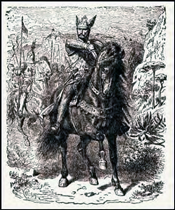
13 Apr 2008
MASSENET: Le Cid
Le Cid: opéra in four acts and ten tableaux.
Mozart and Salieri, an opera in one act consisting of two scenes.
Nicolai Rimsky-Korsakov (1844-1908), composer. Libretto derived from Alexander Puskhin's play of the same name.
First performance: 7 December 1898 in Moscow.
Ariadne auf Naxos, Oper with a prologue and one act. Music composed by Richard Strauss. Libretto by Hugo von Hofmannsthal.
La Vestale, a tragédie lyrique in three acts.
Boris Godunov, an opera in four acts with prologue
Modest Mussorgsky, composer. Libretto by the composer, based on Alexander Pushkin's drama Boris Godunov and Nikolai Karamazin's History of the Russian Empire
First performance: 8 February 1874 at the Mariinsky Theatre, St. Petersburg
Il Trovatore, dramma in four parts.
Only a few months following the premiere of Der Rosenkavalier, Hugo von Hofmannsthal proposed a new opera to Richard Strauss based on Molière’s comedy-ballet, Le Bourgeois gentilhomme (in German, Der Bürger als Edelmann).
Die Entführung aus dem Serail, Singspiel in 3 Acts.
Music composed by Wolfgang Amadeus Mozart (1756–1791). Libretto by Johann Gottlieb Stephanie the Younger, based on an earlier libretto by
Christoph Friedrich Bretzner.
Die Entführung aus dem Serail, Singspiel in 3 Acts.
Music composed by Wolfgang Amadeus Mozart (1756–1791). Libretto by Johann Gottlieb Stephanie the Younger, based on an earlier libretto by
Christoph Friedrich Bretzner.
Arabella: Lyrische Komödie in three acts
Die Entführung aus dem Serail, Singspiel in 3 Acts.
Music composed by Wolfgang Amadeus Mozart (1756–1791). Libretto by Johann Gottlieb Stephanie the Younger, based on an earlier libretto by
Christoph Friedrich Bretzner.
La Gioconda, dramma lirico in four acts.
Music composed by Amilcare Ponchielli (1834–1886). Libretto by Arrigo Boito (under the pseudonym Tobia Gorrio), based upon Victor Hugo's Angelo, Tyrant of Padua (1835).
Don Carlo, an opera in four acts. Music composed by Giuseppe Verdi (1813–1901). Libretto by Joseph Méry and Camille Du Locle after Friedrich von Schiller’s dramatic poem Don Carlos, Infant von Spanien. Revised version in four acts (French text revised by Du Locle, Italian translation by Achille de Lauzières and Angelo Zanardini).
Un ballo in maschera, a melodramma in three acts.
Music composed by Giuseppe Verdi. Libretto by Antonio Somma, based upon the work of Eugène Scribe Gustave III ou Le bal masqué (1833)
Medea: Melodramma tragico in three acts.
Die Tote Stadt, an opera in three acts.
Music composed by Erich Wolfgang Korngold (1897-1957). Libretto by Paul Schott (Julius and E. W. Korngold) after the novel Bruges la morte by Georges Rodenbach.
Some Details concerning the Revolution inaugurated by Rossini
Manon Lescaut, dramma lirico in quattro atti
Elektra: Tragedy in one act.
Lyric Opera of Chicago has announced both schedules and cast-lists for is Spring 2020 performances of Richard Wagner’s Ring Cycle. Given the series of individual productions already staged by the company since Fall 2016, that pave the way for the complete cycle, Lyric Opera of Chicago’s complete production should affirm the artistic might of the great composer.
“Diacono himself does not know what musical talent he possesses” – Mascagni

Le Cid: opéra in four acts and ten tableaux.
Streaming Audio
Music composed by Jules Massenet. Libretto by Adolphe d’Ennery, Edouard Blau and Louis Gallet based on Le Cid (1637) by Pierre Corneille.
First Performance: 30 November 1885, Opéra, Paris.
| Principal Characters: | |
| Chimène, daughter of Count Gormas | Soprano |
| L’Infante, Daughter of Don Fernand | Soprano |
| Rodrigue (Le Cid) | Tenor |
| Don Diègue (Don Diego), father of Rodrigue | Bass |
| Le Roi, Don Fernand, King of Castille | Baritone |
| Le Comte de Gormas (Count Gormas) | Bass |
| Sr. Jacques | Bass |
| L’Envoyé Maure | Baritone |
| Don Arias | Tenor |
| Don Alonzo | Baritone |
Setting: Eleventh Century Burgos, capital of Castille.
Synopsis:
Rodrigue has returned from victory over the Moors, and the first act shows him receiving knighthood from King Ferdinand, at the house of Count Gormas, whose daughter, Chimène, is in love with the warrior. The King and his family approve, although the King’s daughter herself loves Rodrigue. The latter match, however, is impossible since the hero is not of royal blood. The King bestows upon Don Diego, father of Rodrigue, a governorship expected by Count Gormas. The enraged Count insults Don Diego, who, too old to fight, calls upon his son to uphold his honor—without naming his adversary.
Although grieved upon learning his adversary’s identity, Rodrigue is obliged to go through with the duel, and more by accident than design kills the Count. Chimène swears vengeance.
The next scene takes piace in the great square before the palace of the King at Seville, where a crowd of merrymakers has gathered, for this is a festival day. In the midst of the revelry Chimène appears and begs the King to bring revenge upon Rodrigue. The King refuses, and learning that the Moors are advancing, bids her delay her vengeance until the close of the campaign, for Rodrigue is to lead the Spanish forces. Before departing, Rodrigue gains an interview with Chimène, and finds that her love is as strong as her desire for retribution.
At first seemingly near defeat, Rodrigue prays and resigns his fate to Providence. Then there is a sudden turn of fortune and the Spaniards are victorious.
First reports come that the army has been defeated and its leader slain. Chimène has her revenge, but is prostrated with grief and fervently declares her love. A second report reverses the news and Rodrigue returns to find his beloved still implacable. The King, shrewdly enough, now promises Chimène he will punish the warrior, but Solomon-like asks her to pronounce the death sentence. This unexpected decision causes her once more to change her mind, and when Rodrigue draws his dagger and threatens to end his own life if she will not wed him, she is compelled to acknowledge that Love is triumphant.
[Synopsis Source: The Victor Book of the Opera (10th ed. 1929)]